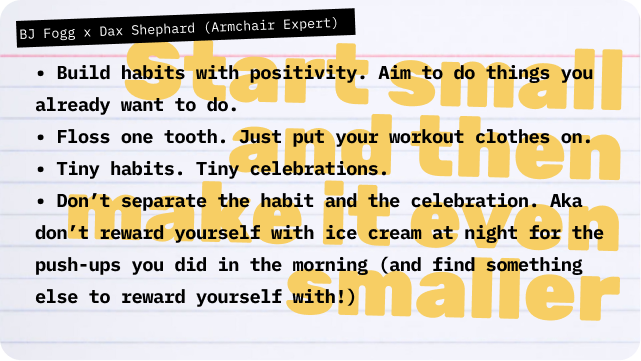Some takeaways:
- His second universal habit recommendation: Learn an instrument—He says that practicing an instrument for 15 minutes every day can be huge. You get to practice focusing, learning something, and it can be relaxing. His first universal recommendation? He calls it “The Maui Habit” (here’s a talk he did about it). When you get up and stand up for the first time each morning, say “It’s gonna be a good day.” If you actually don’t think it will be, even better. That’s when you say “It’s gonna be a good day… somehow.”
- Use positivity—I enjoy BJ Fogg’s approach which is focused on positivity. Do things that you already want to do. If you want to start working out again and you always hated lifting weights but enjoyed running, well, you should start by getting back into running. (BJ Fogg also recommends stepping back from a workout or diet goal and thinking about what you really want out of it. I found at a certain point that the motivation to live healthier is to have more energy through the day and to feel good rather than look better. That’s helped me get more consistent with working out.) Build on top of the things you’re good at. It’ll be easier that way.
- Building habits is a skill—It’s probably one of the most important meta skills you can do for yourself. Similar to learning how to learn, practicing building a habit means that you get better at building awareness and breaking systems down into their pieces and building them back up.
- Epiphany (can’t plan for this), tiny habits, or context changes (can sometimes be impractical if they’re to be effective)—These are three ways to change behavior. Basically go for the tiny habits because you can be deliberate about it and do it without making drastic changes like moving to a different country.
- Tiny habits, tiny celebrations—Just finished a handful of push-ups? Say to yourself “Great job!” Just finished a few squats after using the restroom (your prompt)? Put on a song you love and strike a power pose. He acknowledges these things can feel silly or trivial or both. But you’ll re-wire yourself to look for small wins. (Again, positivity!)
- Don’t separate the habit and the celebration—Another important thing for celebrating: do it right away. Don’t postpone your happiness for when you’re retired or something like that. At the smaller scale, don’t treat yourself to ice cream at night for doing your push-ups in the morning. Your brain won’t make the link between behavior and celebration.
And now, blogging about blogging…
While listening to this episode, I got inspired and opened my laptop up to write a quick post.
I want to build a smaller publishing habit. A daily one where jot down some thoughts about a podcast I listened to in, say, 7 minutes. Five of those in the week would take 35 minutes. At the end of the week I’ll have 5 podcast episodes that I’ve written a little bit about which I can gather up into The Listener, my weekly newsletter with podcast recommendations.
This time, some things that took it beyond 7 minutes
- ~5 minutes making the notecard in Figma
- ~2 minutes gathering the podcast links and formatting that in the post
- ~20 minutes actually writing (I started with 3 bullets in mind and added things as they came to mind)
- ~10 minutes distraction
I’ll keep cutting it down. Cut out some of these meta thoughts, stick to three bullets, get a little more focused, get faster making the notecards and formatting things. And I’ll aim for a little more breathing room.
Maybe 12 minutes would be a good goal.
12 is nice because 5 weekdays would lead to 60 minutes of total writing for the posts
12 is also nice because 2 of them just about equals a pomodoro session (1 minute off the 25 minutes).
Anywa, I’ll catch you tomorrow! (Maybe.)
